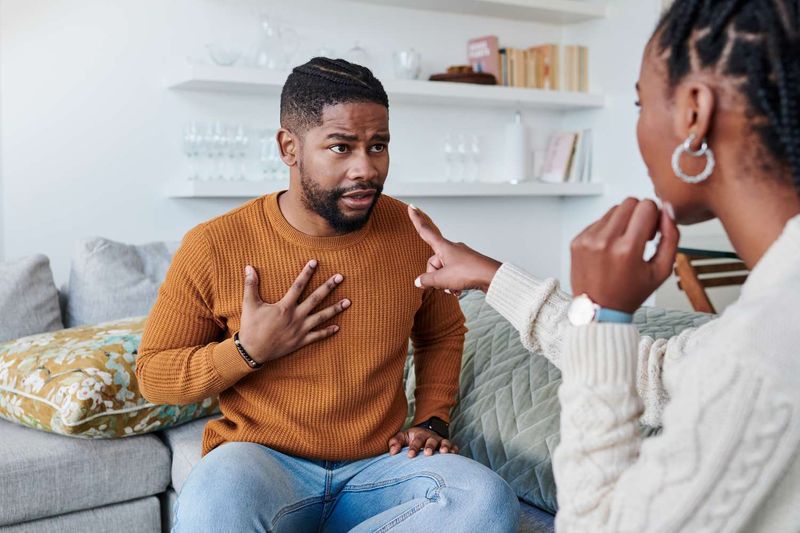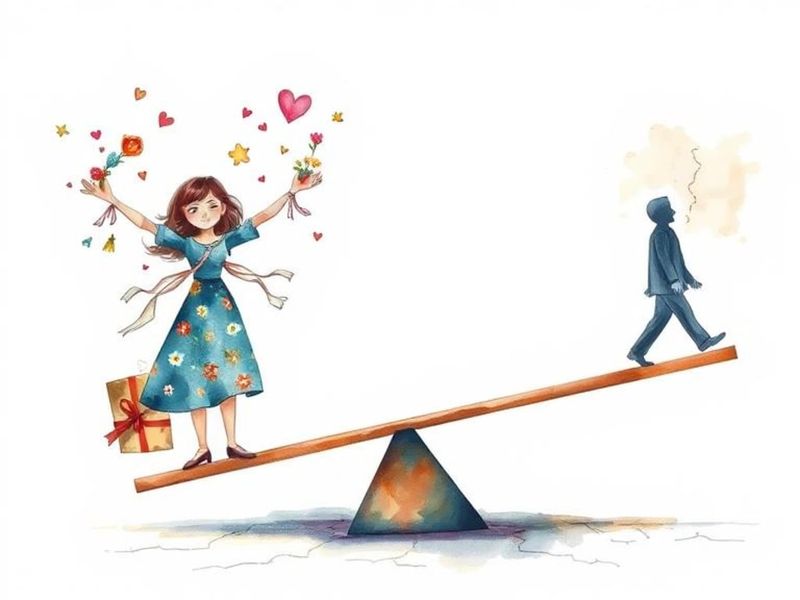Ever feel like you’re doing a romantic solo act while your partner’s just somewhere offstage, scrolling Instagram? You’re not alone. One-sided relationships are like emotional marathons where you end up sweating alone, still waiting for your medal.
It’s messy, sometimes funny (in a tragic way), but recognizing the signs is the first step to reclaiming your energy and self-worth. So, grab a cozy drink and settle in.
We’re about to lay out 17 painfully relatable, sometimes hilarious, always honest signs that your love life might be just a little too much of a one-person show. If you spot yourself in these, don’t worry—you’re not broken. You’re just ready for something better.
1. You’re the Conversation Starter-in-Chief
Ever notice you’re always the one sending that first text? Whether it’s “Hey, how’s your day?” or sending that hilarious meme you spent 15 minutes finding, you’re basically the relationship’s social director. Your phone’s notifications are mostly your own attempts to spark conversation, while your partner’s responses are… sporadic at best.
It’s like being the overly enthusiastic camp counselor who’s pumped for group games while everyone else just wants to nap. You start to wonder if you’re chasing a ghost, or if you’re just really, really into texting.
Di più you realize you’re doing all the emotional heavy lifting, the more glaring it becomes: relationships should be a two-way street, not a one-person parade. If you’re always the one reaching out, maybe it’s time to put the phone down and see if they notice the silence. Spoiler: sometimes, they don’t—and that says everything.
2. You Make All the Plans (and Reservations)
Is your calendar color-coded with date nights, while your partner’s contribution is a shrug and a vague “Whatever you want?” You might as well open your own event-planning business. You know every restaurant’s menu by heart, and yet, your plus-one can’t seem to remember your anniversary.
It’s not just about dinner reservations—it’s always you keeping the relationship exciting, meaningful, and, frankly, functional. Does “spontaneous weekend getaway” ring a bell? Of course not, because your partner thinks spontaneity means forgetting your birthday.
After a while, it hits you: planning should be a team sport, not a solo gig. There’s a unique freedom that comes with realizing you deserve a partner who shows up and pulls their weight, at least when it comes to picking where to eat.
3. You’re the Official Apologizer
Somehow, you’ve become the apology factory. Lost your temper after being ignored? You apologize. They forgot your birthday? You still apologize—maybe you were too sensitive, right? Nope. You’re just stuck in a pattern where keeping the peace always falls on your shoulders.
It’s a funhouse mirror version of accountability: you’re always twisting yourself into knots to smooth things over, while your partner acts like “Sorry” is a foreign word. The emotional labor is exhausting, and your peace offerings start feeling more like bribes for basic respect.
One day you realize: apologizing for existing isn’t love—it’s people-pleasing on steroids. The moment you stop saying sorry for things that aren’t your fault, you start reclaiming your self-respect. Spoiler: it feels amazing.
4. You Sacrifice Your Happiness (and Sanity)
Remember that time you skipped your favorite concert because your partner “wasn’t in the mood”? Or when you watched three seasons of that show you hate, just to keep them company? If this sounds like your personal highlight reel, you know the pain of sacrificing your own happiness for someone else’s comfort.
It’s not about compromise—it’s about disappearance. Your needs get edited out like bad movie scenes, until you can’t even remember what you liked in the first place.
Here’s the plot twist: relationships are supposed to add joy, not subtract it. Choosing yourself isn’t selfish; it’s survival. Give yourself permission to put your happiness back on the menu—extra cheese, hold the guilt.
5. You’re Always Second-Guessing Their Feelings
Ever find yourself decoding texts like they’re ancient hieroglyphs? You reread every message, searching for hidden meaning, wondering if “k” means “I love you” or “I’m over this.” The uncertainty is exhausting; you spend more time analyzing than actually connecting.
The emotional rollercoaster leaves you feeling like you’re auditioning for a part you’ll never get. Their affection is a riddle, and you’re always one wrong answer away from disaster. Trust me, everyone has Googled “signs they secretly love you” at least once.
Here’s the kicker: when you stop obsessing over their every word, you realize you deserve clarity and actual affection, not cryptic puzzle pieces. Life’s too short to play detective in your own relationship.
6. You Feel Like You’re Talking to a Wall
Have you ever shared your deepest thoughts, only to get a grunt or a distracted nod in return? You might as well be chatting with the furniture. Meaningful conversations are replaced by small talk, and your emotional needs float away, unanswered.
It’s not that you’re boring—it’s just that your words never seem to land. You start feeling invisible, like an extra in someone else’s story. Eventually, you find yourself talking less, because what’s the point?
Real connection requires a two-way signal. When you realize you deserve to be truly heard, the silence becomes an unexpected gift—it’s space for your own voice to grow louder.
7. Your Bank Account Takes the Hits
Your credit card knows your partner’s favorite coffee order better than you do. If you’re consistently footing the bill, covering spontaneous purchases, or bailing out your partner’s financial disasters, you’re not a generous partner—you’re an unpaid accountant.
The money talk never goes well, and you end up feeling guilty for even bringing it up. Meanwhile, your savings dwindle, and your partner’s sense of entitlement grows. It’s like the world’s worst investment—except you never see any returns.
Financial fairness is the ultimate relationship glow-up. Protecting your bank account isn’t selfish; it’s self-preservation, and your future self will thank you for it with interest.
8. You’re Their Excuse Machine
“They’re just really stressed,” you tell your friends for the hundredth time. Eventually, even your dog starts rolling its eyes. You find yourself inventing elaborate backstories to justify your partner’s flakiness, as if you’re auditioning for a drama series nobody asked for.
It’s exhausting to play both publicist and therapist. You end up feeling embarrassed, wondering if your friends are secretly keeping tally of your excuses. The truth is, when someone cares, their actions don’t need defending—they just make sense.
Freedom comes when you stop explaining away their absence. Suddenly, you have room for friends who show up and partners who don’t need PR spin. Now, that’s a plot twist worth celebrating.
9. You Leave Hangouts Feeling Drained
Ever walk away from spending time together feeling like you just ran a marathon in emotional quicksand? Healthy relationships should recharge you, but one-sided ones are energy vampires. You give your all and leave feeling emptier than when you arrived.
It’s not about being an introvert or needing more sleep. It’s the emotional labor, the constant giving, and the absence of real reciprocity. Even silence together feels heavy, instead of comforting.
Recognizing this, you start craving hangouts that feel uplifting, not draining. The right people will leave you buzzing, not burned out—and that’s the kind of energy you deserve.
10. Your Efforts Go Unnoticed (Or Unappreciated)
You’ve gone all out—homemade gifts, surprise dinners, remembering obscure anniversaries—only to get a distracted “thanks” or, worse, radio silence. Your gestures land with a thud, and you start to wonder if you’re just the world’s best-kept secret.
It’s not about grand gestures; it’s about feeling seen. Everyone deserves a little (or a lot of) appreciation for the effort they put in. When it’s always you making the magic, it starts to feel less enchanting.
Shifting that energy towards yourself? Suddenly, you’re your own biggest fan, and appreciation becomes a daily habit—no partner required.
11. Every Conversation Is About Them
Ever had a chat where you could disappear mid-sentence and no one would notice? Welcome to the “main character syndrome” of one-sided relationships. Your partner’s stories, problems, and opinions dominate every conversation, while your thoughts fade into the background.
It’s like being a guest star in someone else’s show, waiting for your five seconds of screen time. After a while, you stop sharing, because why compete with a monologue?
Conversations should be mutual, not a one-way broadcast. When you realize your voice matters, you start seeking people who actually want to hear it—and that’s where real connection starts.
12. You Bend Over Backwards to Fit Their Schedule
You’re the human embodiment of Google Calendar—always rescheduling, rearranging, or outright canceling your plans to squeeze into your partner’s world. Meanwhile, their schedule is written in stone, sacred and unchangeable.
After a while, your life starts to revolve around their whims, and you realize you can’t remember the last time your needs took center stage. It’s the ultimate disappearing act: your life, now playing in the background.
Taking your time back feels radical, almost rebellious. The more you prioritize your own plans, the more you remember how good freedom tastes—no approval required.
13. You Can’t Talk About the Future
Bringing up “the future” is like detonating a relationship landmine. Your partner dodges, jokes, or changes the subject, as if commitment is a contagious disease. You’re left guessing what’s next while they act like tomorrow is a rumor.
It’s not about rushing things; it’s about the comfort of knowing you’re building something together. Uncertainty becomes your third wheel, and dreams of shared plans stay stuck on the drawing board.
Once you embrace your own vision for the future—whether solo or with someone new—the world feels wide open again, and hope becomes a habit, not a hazard.
14. They’re Suddenly Attentive… When They Need Something
Notice how affection skyrockets when your partner wants a ride, a loan, or a last-minute favor? Suddenly, they’re Shakespeare’s greatest romantic, until their needs are met. The charm vanishes as quickly as it appeared.
It’s the classic case of selective attention: you’re the MVP only when you’re useful. Otherwise, it’s emotional tumbleweeds and radio silence. The inconsistency makes genuine intimacy feel impossible.
One day, you realize your worth isn’t tied to how helpful you are. When attention only follows requests, it’s not love—it’s convenience, and you deserve much more than that.
15. You’re the Only One Initiating Physical Affection
If hand-holding, hugs, or any sign of warmth always starts with you, it can feel like you’re auditioning for “World’s Neediness Champion.” Affection should be a dance, not a solo routine.
When your gestures are met with lukewarm responses, you start to question your own desirability. The absence of reciprocity is deafening, and the resulting loneliness is almost worse than being alone.
Reclaiming your sense of touch, just for yourself, is empowering. You’re not “too much”—you just know what you need, and that’s something to celebrate, not shrink from.
16. Sacrifices Only Go One Way (Yours)
If you’ve ever skipped out on something you love to make your partner’s life easier, congratulations—you’ve mastered the art of one-way sacrifice. The favor is rarely, if ever, returned.
You keep telling yourself it’s just “this once,” but soon, it’s a pattern. Your partner gets the perks while you’re stuck with the compromise hangover. It’s generosity turned into a one-person show.
Recognizing this, you start saying yes to yourself for a change. There’s something wildly liberating about reclaiming your “no,” and watching your boundaries set you free.
17. Your Needs Are on Mute
Your needs—big, small, or somewhere in between—are met with eyerolls, laughter, or outright dismissal. It’s like speaking into a void. You start shrinking your requests, hoping to be less “demanding,” but the silence just gets louder.
Eventually, you realize that real love is about being met halfway, not settling for crumbs. Your feelings aren’t too much, and your needs aren’t a burden.
When you start honoring your own needs, things shift. The relationship might not last, but your self-worth will—and that’s the best kind of happy ending.


















